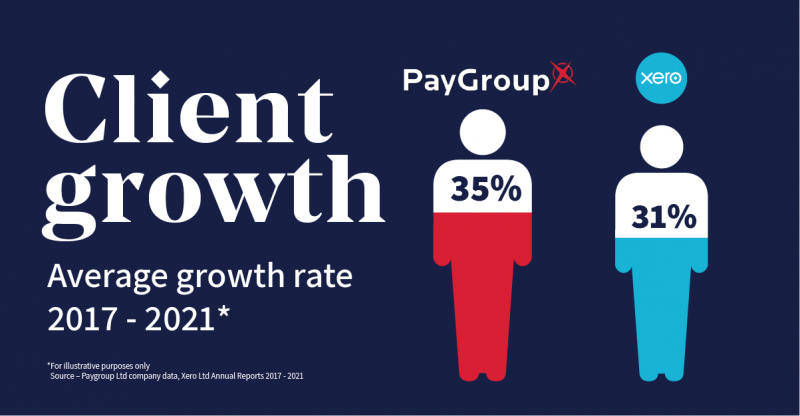- There are several key similarities between PayGroup (PYG) and the $17 billion giant Xero (XRO)
- Both offer similar cloud-based solutions but only PayGroup covers an employee’s entire life cycle, from recruitment to separation
- It’s part of the rise of Human Capital Management (HCM), which takes managing employees further than traditional Human Resources (HR) departments have
- Where Xero is largely tailored to the West, PayGroup identified that the Asian market — particularly in Southeast Asia— is yet to peak
- The region’s young, highly internet-literate population is prime real estate for a software-based company embarking on a phase of rapid expansion
- Shares in PayGroup are trading at 47 cents each
If COVID-19 made anything apparent, it’s that organisations around the world are perhaps more reliant on their human workforces than we had thought.
There are proponents of automation who say replacing people with technology is the key to cutting costs and increasing the efficiency of vital processes.
However, the majority still believe that even the most advanced algorithms and super-computers cannot offset the value that a talented, reliable and committed workforce offers.
It would therefore make sense that the intelligent management of these workforces is paramount, particularly given the fact that structures of employment have shifted dramatically over the last 18 months.
The traditional nine-to-five model is no more — many people work part time, while others spend a portion of their week working from home. A few still work from home entirely.
Where Human Resources (HR) departments have overseen recruitment, training, payroll, compensation and performance management, the rise of Human Capital Management (HCM) takes it’s a step further, turning those functions into new opportunities to drive engagement, productivity and value.
It sees an organisation’s workforce not just as a cost of doing business, but as a core investment whose value can be maximised using specific strategies.
Currently, Xero (XRO) is arguably the most established front-runner in the HR management sector.
The $17 billion giant has its roots primarily in cloud-based accounting software for small and medium-sized businesses, but has come to offer a variety of add-ons like automatic bank feeds, fixed asset depreciation, purchase orders and management reporting, as well as an application programming interface (API) that allows it to be integrated with external software.
Where it falls short, however, is taking those features to the next level.
Since it was founded in 2006, Xero’s product evolution appears to have struggled at times to keep up with its growth in size.
With offices in New Zealand, Australia, the United States, the United Kingdom, Canada, Singapore, Hong Kong and South Africa, it’s relied primarily on a long history of acquisitions to grow its footprint, rather than core technological or strategic advancements.
That’s where PayGroup (PYG) comes in.
The Melbourne-based company is significantly smaller than its older counterpart, with a market capitalisation of around $50 million.

It offers similar cloud-based solutions but covers an employee’s entire life-cycle, from recruitment to separation. And like Xero, PayGroup has also recognised that acquisitions are a key part of growth.
On May 18, it completed the purchase of Integrated Workforce Solutions (IWS), which specialises in workforce management products for the franchise industry in Australia and New Zealand.
With a client base exceeding 1000 enterprise customers, IWS uses a purpose-built platform that includes high-margin modules for rostering, time and attendance, award interpretation, benchmarking tools and bookkeeping, and presents unique cross-selling opportunities capable of driving expansion into new regions leveraging PayGroup’s international presence.
Prior to that, PayGroup acquired PayrollHQ in early November last year — an Australia-based provider of outsourced payroll services that delivers roughly 120,000 payslips annually.
That was preceded by the purchase of TalentOz — a provider of cloud-based HCM software with payroll modules — in July, and Astute One — a HR outsourcing platform — in November 2019.
But, unlike Xero, PayGroup seeks to go beyond the number-centric functions of accounting and into more human territory.
Its PayAsia business, for example, offers the standard banking and treasury services that cater to the lodgement of various taxation, superannuation and pensions submissions.
It also features more in-depth software designed to manage all aspects of the employee life cycle, thereby digitising a broader scope of processes and allowing HR professionals to focus more on what matters — the people themselves.
In itself, that might be enough to separate PayGroup from the already saturated cloud-based software sector. But the real kicker, in fact, is in its target market.
Xero has positioned itself to cater to predominantly Western regions like Australia, New Zealand, North America and the U.K., which are tech saturated.
PayGroup, having listed more recently in 2018, has instead identified that the Asian market — particularly in Southeast Asia— is yet to peak, and that technology adoption in these regions still has room to grow.
For example, of the roughly 670 million people that inhabit Southeast Asia, around half are under the age of 30.
It’s also one of the fastest-growing internet economies, adding an additional 40 million internet users across Indonesia, Malaysia, Vietnam, Singapore and the Philippines in 2020 alone, taking its total user base to an estimated 469 million — roughly 70 per cent of the total population.
This young, highly internet-literate demographic means that the uptake of new technologies in the region is one of the quickest in the world — prime real estate for a software-based company to embark on a phase of rapid expansion.
PayGroup’s client growth rate is certainly on that trajectory, with its client growth rate averaging 35 per cent over the past five years, compared to Xero’s 31 per cent. Although smaller in size, PayGroup’s momentum shows it could be a powerful disrupter in years to come.
COVID-19 has demanded a new way of working, and in order to make that happen, businesses need a new way of managing their workforces.
No longer does that come down to more regular meetings with an HR representative, rather it’s more about digitising traditionally manual processes, so more time can be spent on ensuring you have the best people to do the job and that they have more room to grow as the world inevitably continues to change.
Shares in PayGroup are trading at 47 cents per share as of May 25.








